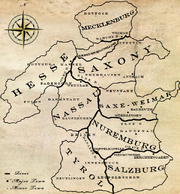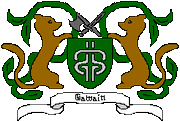
Map of Medieval Gawain
Gawain is a strong and wealthy country that has always been dominated by the weasel family.
Medieval Age[]

The Royal Coat of Arms
A nation that rivals Edwin in power, ruled by the Mustelid. The current system of governement is Feudalist/Constitutional Monarchy, with Duchies ruled over by Dukes, which elect the monarch, usually one of the Dukes. The military is third largest in number, and rivals Edwin's fighting effectiveness. It consists of the Gawainian Army. It is geographically one of the largest countries of Feila.
Government[]
Gawain has a complex and considerably scattered government that is loosely tied together by feudalism. Although Gawain has a king and most Gawainians identify themselves with the nation as a whole, the real governmental power lies with the nobles. Gawain is divided into eight duchies and the capital district of Bayreuth.
The capital district is the only place where the king has direct power whereas the other districts of Gawain are overviewed by hereditary lines of dukes and duchesses. The king (or queen) is unique amongst the other monarchs of Feila as he is voted into his position by the aristocracy. Once elected, the monarch, usually chosen from one of the reining dukes, will often keep his position for life. However, by law, after ten years the king can be disposed from his position by a unanimous vote from the four duchies. Although in a relatively weak position a clever king can take considerable control over the country with the powers available to him. Foremost amongst these powers is control over commerce. All merchants must have a royal charter to conduct business in Gawain. This is also true of exported and imported goods. The king also has the power of population allotment, able to restrict the amount of peasants allowed to work the land in any one of the duchies. A king can literally financially devastate a duchy that is considered out of line. The catch to this, of course, is that if the targeted duchy is able to raise a large enough army before a king can act, enforcement would be difficult without starting a civil war.
The politics of Gawain is often a finely balanced web of agreements. Most of the power wielded by the dukes is enforced by granting land to the landowning class of knights and receiving the loyalty and protection of the armies attached to the knights. Lower on the social scale, peasants still comprise the majority of the population of Gawain and perform most of the labor. More recently, a newer class has risen to prominence due to the proliferation of trade charters being granted. This middle class is comprised of the merchants and artisans who make up the majority of the population in the larger cities.
Culture[]
Gawain is a prideful country with perhaps a sense of superiority over the rest of Feila. The furs of Gawain are far more concerned with uplifting culture than military or financial conquest. This does not mean they have no military capability, as Gawain has a savage history and the mustelids are no strangers to fighting. All Gawainians are taught the basics of combat as the key to the kingdom’s defense is the quick raising of a large militia army. To the outside observer, though, the kingdom can often seem weak with their focus on the arts and small standing army. This is of little concern to the Gawainians who consider the mental arts the most important to develop. As a result Gawain has the highest concentration of educational institutions in Feila. However these are of course only available to the affluent of society. Gawain consistently produces some of the best artistic, philosophical and alchemical minds as is shown by the amount of Gawainian books found in the Azalus Library.
One of the main social problems caused by this success in academia is the exceptionally large gap between the upper and lower classes. Especially with the rise of wealthy merchants, more of the peasant class has turned to thievery. To those visiting the kingdom it can seem like an uncontrolled den of thieves. The truth is that the government, mainly the duchies themselves, is putting a large effort into stopping the growth of thievery. With the small garrisons of soldiers available this effort has led to an equal growth of mercenaries. This leaves a prosperous country with a war between the classes hidden in the shadows.
Despite this rift between the wealthy and the poor, Gawain could be considered the most forward-thinking countries in regards to rights and freedoms. Although not written law, generally no discrimination due to gender or species can be found in Gawain. Anyone has an opportunity to succeed in their endeavors...provided they do so within their class. The one exception to this is Gawainian attitude toward felines. The blood feud between the mustelidae and the felidae is an old hatred and any feline within the borders of Gawain has a very good chance of finding trouble. Gawain is also very religiously tolerant. Gawainians tend to not care who worships what, though most of the mustelidae practice a complex polytheistic religion called Asarath.
It should be noted that, although this is a general consensus on Gawainian culture as a whole, culture can vary widely across Gawain. Since the duchies of Gawain are essentially independent nations, what is common practice in one duchy could be wildly different in another. Gawainians still tend to think of themselves as a single country though to a traveler it would certainly seem to show otherwise.
Age of Muskets[]
The Gawain Empire draws parallels with the 18th century Prussian Empire, and other European nations such as Austria in this age. Gawain has been united under one ruler, and it generally is allied with Edwin by default, simply because they get a bigger reward for doing so. The have the second most powerful Army next to Edwin, although its navy is more a load of troop transports, Gawain having no interest in the art of Naval combat. This nation is also where the majority of advances in music are made, with many soon-to-be-famous composers hard at work at this time. Its army's uniforms are black, with the familiar cross that the two white straps make across the chest and back, black gaiters and black tricornes.
Age of Steam[]
The Reich of Gawain is similar to the German state during the early 1900s in this age. With the end of the first major war between Edwin and Gawain, the latter coming away the worse for wear, the country of Gawain isn’t doing as well as it could be. Industrialized, but not to the point that Edwin is, Gawain has been scrambling to take care of the workers it promised to protect while still keeping a semi-stable economy. This has resulted in the two major parties of the country blaming the ailing government for a. not becoming communist and b. not becoming fascist. Currently, there is a political and social struggle taking place in the country between the right and left extremists. This battle has encompassed innocent civilians, but the moderate government is attempting to take control of matters with some small financial assistance from Yamaha. Similar social reforms to those taken in Edwin have occurred, but the classes are not so divided as in the Monarchy as everyone is suffering in the aftermath of the War. Cats (with the exception of those with Yamahan citizenship) are still seen with distrust and since the economy began its downward spiral, feelings toward the Edwinish citizens have become especially strong.
Age of Drive-by Shootings[]
Crime in the Republic of Gawain is down since the early medieval ages, and there has been an industrial revolution. Gawain is heavily focused on its army, and has one of the world's most powerful militaries, though, falls behind Kahun.